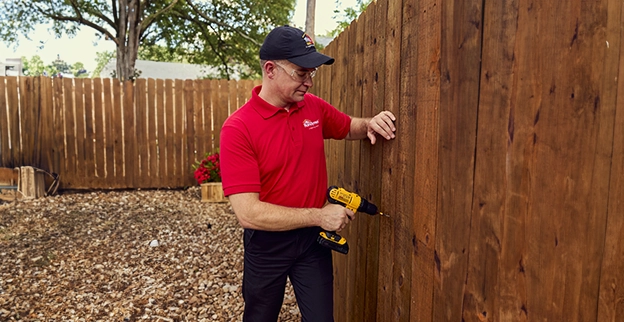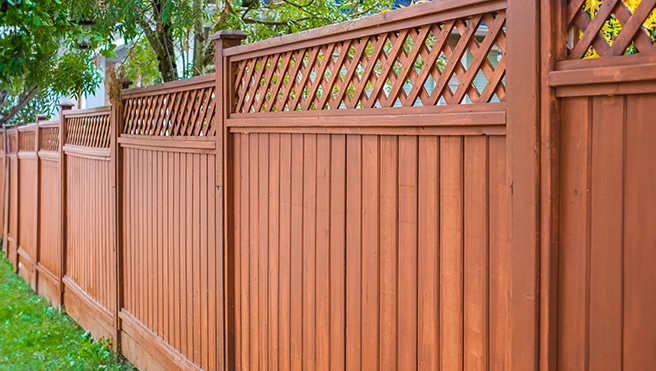Before we get into the warning signs that require fence repair in Lehi, UT, you can learn more about the wide range of fence types and materials we work with. They all have different characteristics and functions. Perhaps you have recurring problems with your existing wooden fence and want to learn about alternatives that don’t require as much maintenance. Or maybe you are planning a brand-new project and want to install the right type, using the best materials that suit your needs.
Our Lehi fence repair experts are well-versed in all fencing materials, including:
Cedar Wood
Cedar is a natural wood type that is preferred by many homeowners who want a piece of nature. Not only is cedar naturally moisture- and bug-resistant, but it’s also versatile and environmentally friendly. Since cedar trees grow throughout the state of Utah, you can sustainably source your cedar wood in the surrounding areas of Salt Lake City without draining your wallet.
The only downside to cedar is that it can be prone to rot when it’s unsealed and installed too close to the soil, causing it to need fence repair in Lehi, UT. We have noticed bad installation jobs in the past where fences were installed perpendicular to the ground, and the base of the posts was in too close contact with the soil. Our local Lehi fence repair handyman recommends using steady concrete bases to avoid this issue. This will ensure that your cedar material will meet its maximum lifespan. Although cedar can easily get through without sealing, it’s better to regularly apply a layer of protective sealant to prevent its vibrant color from fading too soon.
Pressure-Treated Lumber
Pressure-treated wood, such as pine or spruce, is easy to order at your local hardware store. You won’t need to worry about treating it because it will all be done for you. Being pressure-treated means the wood has been injected with preservatives and other chemicals that make it moisture- and bug-resistant. It’s weather-resistant and withstands all four seasons, including issues caused by most types of soil. Seasonal maintenance for pressure-treated wood from our Lehi fence repair pros often includes pressure washing, resealing, and occasional plank replacements. Well-maintained pressure-treated pine can last up to 25 years with few repairs.
Composite
When composite decking hit the market, people began to wonder, “Why not install a composite fence?” As a synthetic fence material, composite does have a blend of wood fibers and is occasionally referred to as “synthetic wood.” Plastic agents add to the composite’s resilience and weather-resistant qualities. Many homeowners in Lehi choose composite because they prefer the wooden surface look and, moreover, the highly durable materials used to make it strong and robust. It barely needs any cleaning, which strikes most people as one of the best qualities of composite.
All these pros come with one single con—the higher price tag. Unlike cedar or vinyl, composite materials are more expensive and can be time-consuming to source. Composite also varies in quality, which means that finding a trusted supplier can be difficult but should still be a high priority. The search is worth it, though, and you might save your time by calling our Lehi fence repair professionals.
Who wouldn’t want a rot-proof fencing system that can last up to 30 years with little to no need for fence repair in Lehi, UT? If you have composite fencing, you may notice some color fading over time because this material does leach out some natural wood oils (tannins). This problem can be solved with Lehi fence repair services, during which we will help you restore its original looks.
Vinyl
Want to know more about synthetic materials? Vinyl fences are commonly used because they can mimic wood without being wood. It is made of hollow and solid PVC materials, and over the years, manufacturers have enhanced vinyl’s qualities by giving it more thickness to withstand outside elements. Vinyl fencing is customizable, low-maintenance, and durable, with no staining required.
One downside of vinyl is that it cannot withstand high impacts as well as wood. If one area breaks, you will likely need Lehi fence repair and replacement services, where several fence sections and planks need to be exchanged. Another downside is that it easily develops mildew if installed in a grassy area. While cleaning only requires mild soap and water, it may not be in the interest of everyone to choose vinyl.
Wrought Iron and Other Metals
Wrought iron fences take us back to Victorian times and are still in use, although some property owners may opt for other metal materials, such as an aluminum fence, steel, or cast iron. Metal-based materials are known to last for centuries. While rust is still the most common issue for wrought iron and steel that has lost its protective layer, it’s an easy Lehi fence repair that involves wire brushes and sandpaper. To recover its original looks, we’ll use a top-quality, rust-inhibiting primer to reseal the material.


